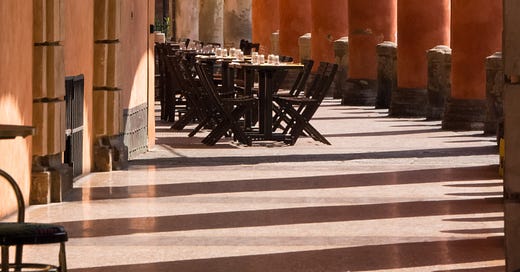1
I should begin with how I loved him, in what manner, to what degree, with what kind of incomprehension. In its every detail — its hesitation, its abstraction, its moreish commas — the first sentence of John Berger’s The Red Tenda of Bologna is about longing. I have thought about it every day since I first read it, at the start of June.
2
We went to Bologna, like Berger. I made us walk all over the city in search of a particular gelateria that wasn’t in the guidebook, and when we got there, I produced my one Italian phrase, lei parla inglese? to shrugs. Quali gusti? You had chocolate and hazelnut and I had pistachio and cherry, and we paid all in coins and walked home under the fascinating red arcades where, in the middle of February, people sat outside with mortadella and wine. What did it mean? I think I knew at the time.
3
They closed Italy the week after we got back. The pictures of the empty Piazza San Marco showed more pigeons than seemed possible, crowded like pilgrims on a holy day — as if the cathedral had been built for pigeons; as if human absence was a natural state. Human absence does not seem like a natural state now. In fact, your absence is at times as much of a presence as if you were still in the next room, hunched over your laptop well after work hours.
4
I keep very busy to keep from thinking of you, and Italy, and the way you looked when we sold our dining table. I learn to embroider, one side all clarity and the other all knots. I make a raincoat to keep the world out. I begin, God help me, lighting a scented candle in the evenings. Am I the sort of person who lights scented candles? Am I the sort of person who owns candles? What sort of person am I?
5
What is the music to fix a broken heart? I think it is Kendrick Lamar. Luckily, he releases a new album right into the void of May. I love this music that allows room for hurt and anger; reminds the listener, in fact, of all the things, political and personal, there are to be angry about. After two weeks I know every last breath: the high-pitched shoo!s, the brrrs, the momentary lisping for colour, all the different manipulations of triplets. The rhythms are half the meaning, which is more like Berger than you might expect. I listen closely to the expletives and the vulnerability, how artfully they are threaded together. The pairing of defenselessness and defensiveness seems like some kind of lesson.
6
There’s a line in a Zadie Smith essay — have you read it? — that sums up all the truth: It hurts just as much as it’s worth.
7
Everybody is doing something big. Everybody is moving to London or New York, everybody is changing jobs, getting married. Do we make all these changes to avoid the work of staying the same? Sometimes it seems like we are running in a contest we never meant to enter, the contest of being successfully young. Can you have the relationship, the covetable job, the apartment in the city? Can you do something impressive before you’re 30? When will you (you will, won’t you) have a baby? I am jealous of everybody and also, somehow, I don’t want to do what anybody I know is doing. I want something else, but I still don’t know — how stupid, how lucky — what it is.
8
I go swimming at night with a friend visiting from overseas. We gasp and shriek in the icy water and she says, nothing lasts, meaning somehow love and sadness and the tide all at once. I keep coming after she’s left, parking in the winter-dim carpark, unfolding a towel stiff with salt. Bobbing in the black water, touched all over by the sea, I know my solitude and I’m not afraid of it.




Really, really loved this, Maddie 🤍